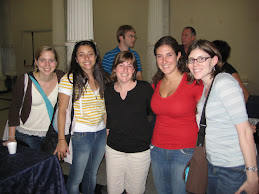The Things I Took for Granted…
Being a teacher myself, I’ve been very interested in the way that the university trains its teachers. Today, I witnessed something pretty important. First, a little explanations are in order.
In the final (usually 4th) year of the program, students are required to observe for a total of 60 hours in the public schools. These 60 hours are broken down into a specific amount (about 10) of observations required at each level (from Kindergarten up to Polimodal [college prep]). Just like in the US, second language teachers here are certified in all levels of school (K-12). These 60 hours of observations serve as the students’ only source of in-field training before “student teaching” on their own. To an education major at Elon, 60 hours is very reasonable. Education majors probably serve more than 60 hours when all their practicum hours are totaled for each semester preceding student teaching. Anyone serious about becoming a teacher must recognize the importance of this in-field observation experience because learning the theory about teaching and actually teaching can be very different. However, many students complain about the large number of hours required. But to be fair to the university, I must add that students are given a grace period of up to a full year to complete the 60 hours.
Well, today there was a meeting of all the students and professors in the English department. The head of the university received a letter from an angry English student. This student, a woman in her 40s who (according to unnamed sources) does not have much interest in teaching and simply attends classes because they’re free and she likes English, wrote a letter of complaint to the head of the university about the “ridiculous” amount of hours required by the English department. Also, she felt that observing in every level (K-12) was unnecessary. This student had not even mentioned her concerns to the professors in the department before sending this letter. Then, without even consulting the professors in the department about the matter, the head of the university took it upon himself to declare that the department must lower its number of required observation hours. Not only that, but students also will no longer do ANY observations in primary schools – only secondary schools. So because of the disgruntled opinions of one woman, all of the students in the English department are now limited in their already limited teacher training.
Luckily, the professors and students are eager to take a stand. The meeting today was held so that the situation could be explained to the students. Students and professors expressed their concerns about the new “mandates,” and the meeting ended with all the students signing a letter to the head of the university asking for him to reconsider. Now we have to wait and see what the head will say. But honestly, what was he thinking in the first place? I can’t believe he wouldn’t even discuss the matter with the professors before making such a huge decision. Also, how can anyone offer a degree to teach any level without also offering the opportunity to train at every level???? I could go on forever about how much I was appalled by this, but I’ll stop before I get carried away.
Although I greatly admire the professors here, I also must admit that being a part of the higher level education system in Argentina has made me realize just how amazing my education was at Elon. I realize now how much money, time, and experience it must have taken to develop the education program to where it stands today. I know that sometimes students complain about the transportation, lack of involvement, strange circumstances or placements, etc. that go along with a practicum in the education field; however, the fact that students at Elon are given the opportunity to have so much in-classroom experience before even reaching their final year in the program is incredible. It takes the willingness of schools in the community as well as support from the university to make that kind of system work. And, sadly, those are two things that the university here greatly lacks.
The Culture of Education
I’ve made some interesting observations about the culture of education here in Argentina. One of the professors that I work closely with taught full-time at the secondary school for many years. She still teaches a few English classes a week in the primary and secondary schools. Talking to her about her teaching experiences, resources, and the attitude of students, I’ve come to a few conclusions:
1. The Power of Money and Competition – Although I don’t like the fact that higher education in the US is so expensive, there is something to say about how scholarships can motivate students. Many students cannot afford college on their own; they rely on scholarships and loans to make it through. However, scholarships aren’t given to just anybody. You can’t go to school just to “socialize” and come out with a 4.0 GPA and tons of scholarship money in your pocket. You have to work for the grades, the skills, the leadership opportunities, or even the sports. Even if money doesn’t concern you, there’s still the competition to get into the college of your choice. You could have all the money in the world, but if Yale doesn’t want you, you’re not going to Yale. Selectivity and cost are some strong motivators to get students interested in their own education, especially at the secondary school level. Not to say our high schools don’t have problems, but at least these motivators exist.
Public university education in Argentina is free. The majority of high school students don’t seem to care much about their education. They come to school to socialize, not learn. They aren’t greatly challenged, and they aren’t greatly concerned about their futures (in terms of education). If students choose to go to university after secondary school (there are quite a large number who DON’T even though it’s free), they don’t feel any particular rush to graduate. Since all the classes are free, it doesn’t really matter how many times you fail – you just re-take the class again and again. I’ve met many students who have taken the same class 3, 4, or more times before passing. But it’s normal here, so it doesn’t bother them too much. In the US, we pay for each class we take. Failing a class doesn’t just set us back in terms of graduation credits; it sets us back financially if we have to re-take the class.
2. Problem Professions – Argentina is suffering from a shortage of professionals in certain key areas, such as engineering and specialized medicine. These kinds of careers require that students pass certain admission tests before entering the university programs. I mean, no one wants a doctor who can’t do basic mathematical conversions for example. But most students here just coasted through high school; they’re not mentally prepared for such demanding tests of their knowledge. So, rather than go through the difficulties of preparing for such an exam, students choose to study other professions instead. Right now, there seems to be a consensus among Argentines that the country has way too many people studying psychology than any possible future demand for psychologists. But it’s a free and interesting career to study. From an 18-year- old’s point of view, why not? This is just one of many examples of this growing problem. Fewer and fewer graduates are emerging from the much needed specialty fields of science and medicine, while more and more Argentines between the ages of 18 and 25 are either slowly making their way through university, working, or simply doing nothing at all.
So What???
So after all this venting, what solutions do I have to offer? Right now, I feel like the only real solution would involve changing the entire educational system in Argentina – from the ground up. Change the way teachers are trained so that they focus more on challenging students and motivating them to succeed. Change the way schools are run so that there is more rigor and discipline. Change the way education itself is viewed and valued in the country.
Well, these all sound great, but there’s no easy way for all that do be done. It requires all kinds of money, government support, formal education, willingness of teachers and parents, etc. I would love to play some kind of part in changing things for the better, but I don’t know how much of a difference I can make on my own, especially as an “outsider” to the country.
Fulbrighters in Argentina

Wednesday, May 14, 2008
Subscribe to:
Post Comments (Atom)


No comments:
Post a Comment